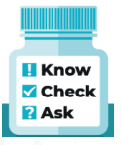You can download this leaflet as a PDF here
What are SGLT2 inhibitors?
They are medicines for Type 2 Diabetes, Heart Failure and Chronic Kidney Disease
• They help your heart pump better, which may stop hospital admissions and help you live longer
• They protect your kidneys and may stop or delay the need for kidney dialysis
• In people with Type 2 Diabetes, they reduce high blood sugar levels.
Possible side effects (all medicines have side effects)
 DEHYDRATION (Common side effect)
DEHYDRATION (Common side effect)
You can expect to pass more urine because of the way this medicine works. This effect helps protect you and can improve over time. Make sure you stay hydrated. Avoid excess alcohol as this makes dehydration worse. If you are on a fluid restricted diet, try to stay within your limits. GENITAL AND URINARY TRACT INFECTIONS (Common side effect)
GENITAL AND URINARY TRACT INFECTIONS (Common side effect)
Reduce your risk by washing and drying genitals daily (use mild, non-perfumed products). Cotton underwear also helps. Make sure to change your underwear daily. Thrush is a more common side effect in people with Type 2 diabetes, due to more sugar being in the urine. SKIN INFECTION (Very rare side effect)
SKIN INFECTION (Very rare side effect)
There may be a link between these medicines and a very rare skin infection of the area around your genitals. This skin infection is called Fournier’s gangrene. The main symptom to be aware of is severe pain when pressing the skin over the groin area. Contact a doctor urgently if this area becomes red, tender or swollen. DIABETIC KETOACIDOSIS (DKA) (Rare side effect)
DIABETIC KETOACIDOSIS (DKA) (Rare side effect)
These medicines may cause too much acid in your blood. Contact a doctor if you are taking this medicine and have any of the following symptoms: tummy pain, nausea, vomiting, fast breathing, drowsiness, confusion or a sweet smelling breath. The risk is higher if you go a long time with very little food or water, take too much alcohol or are sick. This is a rare side effect, but is serious and can happen even if you do not have diabetes. See ‘SICK DAY GUIDANCE’ on the next page
Important Information To Be Aware Of
 SICK DAY GUIDANCE (WHAT TO DO WITH YOUR MEDICINE IF YOU BECOME UNWELL)
SICK DAY GUIDANCE (WHAT TO DO WITH YOUR MEDICINE IF YOU BECOME UNWELL)
If you become unwell with any of the following: vomiting, diarrhoea, fever, sweats, shaking or reduced fluid intake, PAUSE taking this medicine but RESTART once you are well again (after 24 to 48 hours of eating and drinking normally). PREGNANCY
PREGNANCY
Do not take these medicines if you are pregnant. Contact your doctor, nurse or pharmacist if you are planning a pregnancy. DIET
DIET
Do not start a very low calorie diet, low carbohydrate or ketogenic diet when taking this medicine. Contact your doctor, nurse, pharmacist or dietitian if you want to start one. These diets all involve reduced intake of bread, potatoes, pasta or rice. FOOTCARE
FOOTCARE
If you have type 2 diabetes, it is important to attend your routine foot checks and maintain good foot hygiene. Seek urgent medical attention if any foot problems are experienced when taking this medicine. SURGERY
SURGERY
SGLT2 inhibitor medicines must be stopped before surgery. If you are having a planned surgery, talk to your doctor, nurse or pharmacist about how many days before surgery you should stop your SGLT2 inhibitor medicine.
 FURTHER INFORMATION
FURTHER INFORMATION
To learn more about possible side effects, read the patient information leaflet, inside the box with your medicine. If you have any concerns or questions, talk to your nurse, pharmacist or doctor. They are here to help you understand your medicine better.
 Website links for useful information:
Website links for useful information:
Patient information leaflets for medicines can also be accessed at this website:
www.medicines.org.uk/emc (enter the name of your medicine into the search bar)
Information of how to manage low blood sugars (hypoglycaemia) is available on the Diabetes UK website:
www.diabetes.org.uk/about-diabetes/looking-after-diabetes/complications/hypos
Information on how to manage your diabetes when you are unwell is on the Diabetes UK website:
www.diabetes.org.uk/living-with-diabetes/life-with-diabetes/illness
